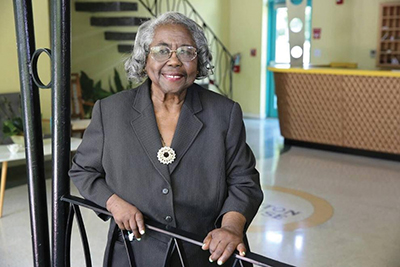By Miami Times Staff Report
Dr. Enid Curtis Pinkney, a remarkable figure in Miami’s history, has died. Her passing was announced in a Facebook post this morning by the Brownsville Civic Neighborhood Association, Inc.
“It is with heavy hearts that we mourn the loss of historian, community icon and BCNA Past President: Dr. Enid C. Pinkney. Her legacy of work for our community has chartered a course in historic preservation for generations to come … Thank you, Dr. Pinkney, for all of your pioneering work in the community; for pushing the next generation to stand up and fight to preserve our history and for paving the way for African Americans to hold leadership roles in preservation, here in Miami. You will be sorely missed. May you rest peacefully in the Master’s arms.”
Born in Miami of Bahamian heritage, Pinkney graduated from Booker T. Washington High School in 1949. She held a B.A. degree from Talladega College and a M.S. degree from Barry University and received honorary doctorate degrees in Humane Letters from both St. Thomas University and Talladega College. Pinkney worked as a social worker from 1953 to 1955, after which she worked in the Dade County Public School System until she retired as assistant principal at South Miami Middle School in 1991.
Her contributions to the community throughout her lifetime were extensive.
Dr. Pinkney conducted research on African American burials that took place from 1896 to 1990 in the City Cemetery. Then in 2012, she led a re-interment service at the Lemon City Cemetery, where human bones unearthed in 2009 were re-buried. She also wrote articles and columns about Miami’s history, including “Fifth Court Revisited” and “Overtown was My Town.” Additionally, she produced documentaries on topics such as the Historic Hampton House and historical perspectives of Brownsville.
As the first Black president of Dade Heritage Trust and Natives of Dade, Dr. Pinkney played a pivotal role in saving the Miami Circle from demolition. She also saved the Historic Hampton House from demolition and led its restoration efforts. The segregation era Green Book motel now serves as a cultural center and museum in Brownsville.
Last April, at age 91, she spoke against Hialeah’s plan to annex part of Brownsville at a news conference held by the Brownsville Civic Neighborhood Association (BCNA).
“Please do not let anybody take your heritage,” she said. “They’re not going to be in sympathy with your heritage. They’re not going to be in sympathy with your culture and the legacy that has been passed down from generation to generation in this community. We have a rich history. We need to learn it, so we can defend it.”
Just look to Overtown, she warned, which has been trying to restore its legacy since Black residents were pushed out and divided by new highway constructions in the 1960s.
“You have to be very careful when the government comes through with a proposal, because that’s how we lost out on Overtown,” Pinkney said. “They came through with this urban renewal, which was nothing but Black removal.”
Dr. Pinkney served on the Board of Directors of the Florida Conference of the United Church of Christ and was a founding member of The Church of The Open Door. She used media platforms to inform the public about critical issues, such as preventing the construction of an ecotourist resort on the historically significant “Colored” Beach at Virginia. Then in 2022 she came to a city of Miami budget meeting to express her outrage at the commission’s firing of the all-Black Virginia Key Beach Park Trust board and its public takeover by commissioners. She also vehemently opposed the city’s plan to move homeless people to the key, a plan that was eventually abandoned.

